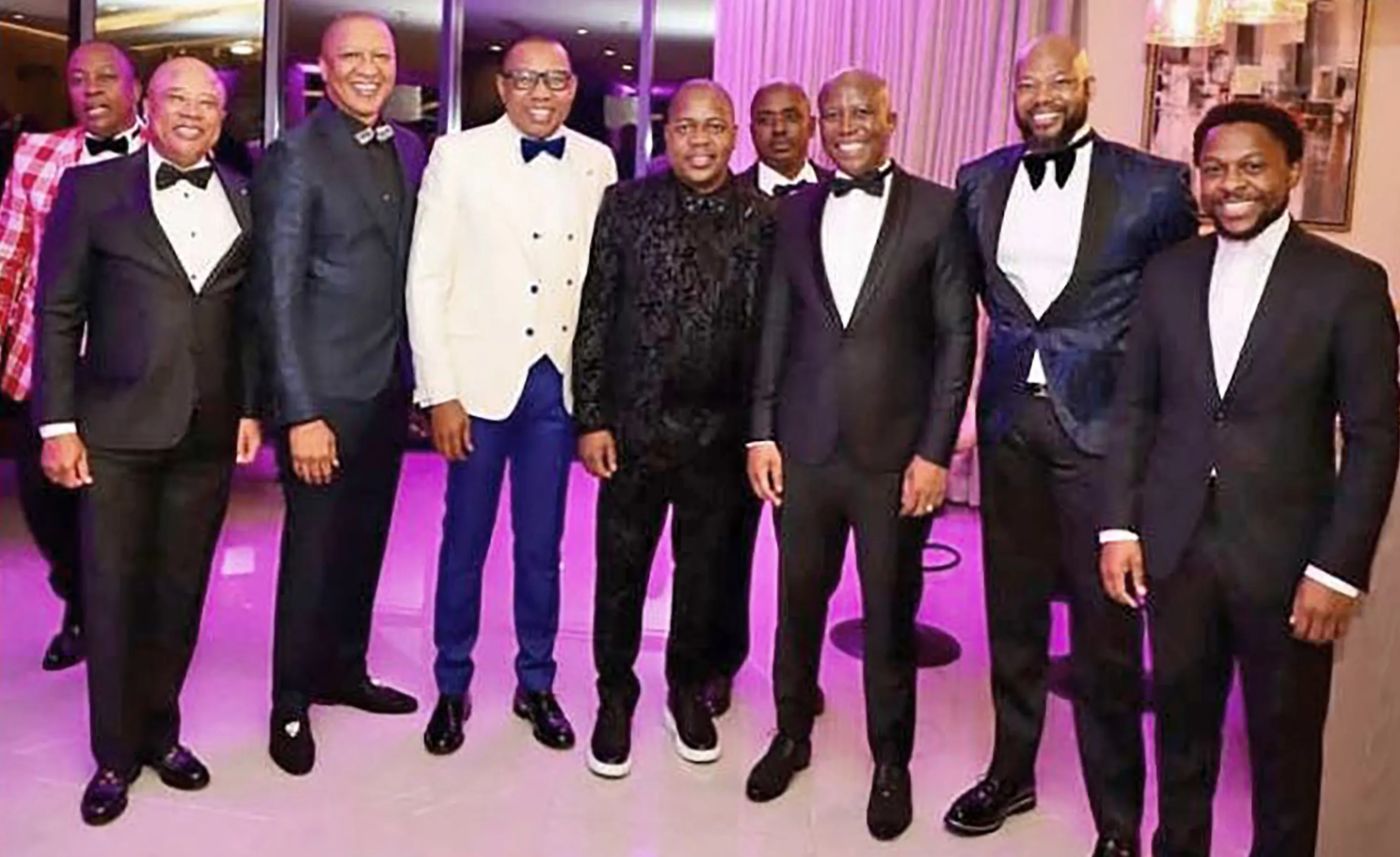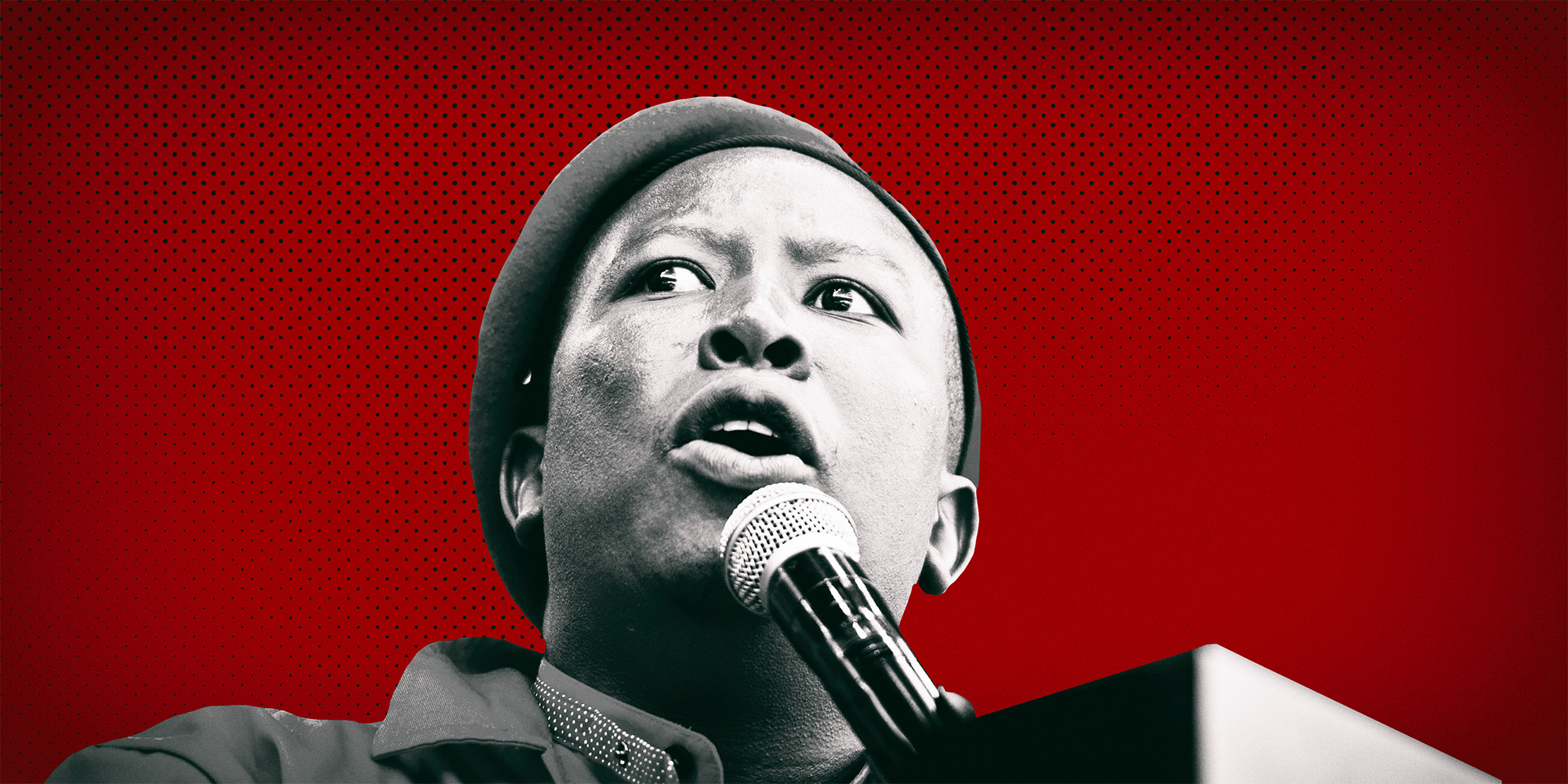In the upset of upsets this week, the EFF voted with the DA and propelled it into government in the country’s big cities. It saw ANC mayoral candidates fall like skittles.
What was behind this move?
In a post-election briefing on November 25, EFF leader Julius Malema said the party had consistently said its mission is to unseat the ANC. With a weakened governing party, Malema has smelt blood and spotted a way to the Union Buildings.
The EFF will not form governing coalitions with the DA, and neither will it obstruct municipal governments where it holds kingmaker power, he said. Instead, what is happening is a nascent political realignment.
 Tony Yengeni, Sisa Ngebulana, Mduduzi Manana, Mzwandile Masina, Julius Malema and Mbuyiseni Ndlozi. (Photo: @juliusmalema on Twitter)
Tony Yengeni, Sisa Ngebulana, Mduduzi Manana, Mzwandile Masina, Julius Malema and Mbuyiseni Ndlozi. (Photo: @juliusmalema on Twitter)
As the image above – from a tweet by Malema a while ago – shows, Malema retains close links with the Radical Economic Transformation (RET) faction of the governing party. The photograph shows him with Tony Yengeni, the godfather of RET, and Mzwandile Masina, the former Ekurhuleni executive mayor who was toppled this week, among others.
At the briefing, Malema had inside detail on how the ANC averted defeat in eThekwini where last-minute finagling saw the party retain its heartland metropolitan council. He said that suspended ANC Secretary-General Ace Magashule had saved the day – a narrative reported by Iqbal Survé’s Independent Media titles. Magashule is said to have been joined by former health minister Zweli Mkhize in getting small parties to change their votes in Durban.
The RET faction is open in its admiration of Malema, as Nkosentsha Shezi, one of the faction leaders, made evident in this tweet:
In IsiZulu we say he has no chest. He will expose you for who you are. @CyrilRamaphosa @MYANC pic.twitter.com/wnAkgBFV9h
— Nkosentsha Shezi (@NShezi) November 25, 2021
This faction lacks a leader with a national appeal like it had in former president Jacob Zuma. The EFF leader can fill that vacuum, and while Malema is anti-ANC, he is in truth anti the Ramaphosa ANC. Ramaphosa expelled him when he chaired the party’s disciplinary appeals committee, a slight Malema raised in his post-election briefing.
The mechanics of how this might work are still unclear, but the machinations are not. And Malema’s voting decision in hung councils revealed the bigger plan.
That plan is to topple the ANC of Ramaphosa come 2024 by denying it governance of the cities. The party has been weakened by the outcome of the November 1 election, particularly by the loss of cities, where urban power lies. Ramaphosa now sits in the ignominious position of being a modern man of the town and the boardroom who has led the ANC into becoming a declining former liberation movement consigned to the rural areas.
If the president’s reform drive does not deliver jobs, reliable electricity, safety and efficient water, it’s not difficult to predict that 2024 will accelerate the decline. He will, of course, have to clear a big hurdle before that, a possible toppling by the unhappy ANC branch delegates at the 2022 national elective conference. The EFF's support for DA mayors will certainly weaken Ramaphosa's re-election bid.
This all suits Malema.
It is taking too long for the EFF commander-in-chief, as he styles himself, to win national power. The EFF did well on November 1, making a two percentage point gain, but it was nowhere near the 65% win that Malema believed he had in the bag. The EFF ran a more extensive and more glossy campaign than the other major parties. It has failed to declare funding to the Electoral Commission for two quarters, so it is unclear where the money came from.
In 2019, the party predicted a national win and was nonplussed when it got below 10% of the national voting pie. In coalition talks, the EFF was desperate for a display council to run while it tabled a set of national policy demands. Many ANC regional leaders were prepared to meet them, but the party’s NEC refused, knowing it would crown Malema the de facto president.
Daily Maverick’s elections analyst Wayne Sussman said the EFF had made a pink splash, not a red wave, this time around and growth would be slow and steady; too slow for a party that sees itself as a planet and not an asteroid.
According to Ipsos research for the ANC-aligned think-tank, the Integrity Institute, “President Ramaphosa is by far the most popular political leader in the country. Some 66% of the population as a whole evaluate him positively. President Ramaphosa also has a positive trust index score of 38, as opposed to the DA leader’s minus 37 and the EFF leader’s minus 24,” the institute found.
But that popularity is being tested by the slow pace of Ramaphosa’s reforms, by constant load shedding and ongoing corruption. DM
[hearken id="daily-maverick/8881"]




 Tony Yengeni,Sisa Ngebulana,Mduduzi Manana,Mzwandile Masina,Julius malema and Mbuyiseni Ndlozi Photo: @juliusmalema on Twitter
Tony Yengeni,Sisa Ngebulana,Mduduzi Manana,Mzwandile Masina,Julius malema and Mbuyiseni Ndlozi Photo: @juliusmalema on Twitter 